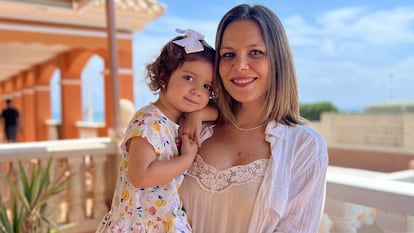Being a mother despite breast cancer: ‘I found out that I was pregnant and that I had the disease at the same time’
Two women share their story of motherhood after diagnosis. Mónica Piqueres received treatment while pregnant with her daughter; Laura Rueda took part in a medical study that meant pausing her therapy in order to have a baby

Like a flower sprouting through concrete, even in the most adverse conditions, life finds a way. Mónica Piqueres Mateu, 37, found out that she was pregnant and that she had breast cancer at the same time: “In April 2020, in the middle of the pandemic, they detected a cyst and did a biopsy; the next day I knew I was going to be a mother, and two days later I got the diagnosis.” The bittersweet news would be followed by even worse ones: “I was in a private clinic, and they told me that I had to start the treatment quickly and stop the pregnancy because the medication was incompatible; that I was young (I was 34 at the time) and I could have more children. Then I called a gynecologist who was a friend of the family. He referred me to the public health service [in Spain, where they explained that they were going to treat me and carry out the pregnancy. And that’s what they did.”
Piqueres was 12 weeks pregnant when she entered the operating room. Two months later, once the first trimester was behind, they administered the first phase of chemotherapy. “I gave birth on December 11, 2020, at 40 weeks pregnant, and 10 days after delivery they gave me another type of chemotherapy that I couldn’t receive before, as it is contraindicated.”
Maintaining the pregnancy while treating cancer is not uncommon in clinical practice, explains Begoña Bermejo de las Heras, coordinator of the Breast Cancer Unit of the University Clinical Hospital of Valencia and researcher in the Research Group of Biology in Breast Cancer of the INCLIVA Foundation. “During the first trimester of pregnancy we cannot administer any type of systemic treatment, neither chemotherapy nor oral drugs, but it is possible to operate, just as if the woman were not pregnant,” she says. “In the second and third trimester we can already use the most effective medication for breast cancer. However, radiotherapy is contraindicated throughout pregnancy.”
Dealing with a torrent of bad and good news is not easy. “You must seek a balance between the best news that you can get (pregnancy) and one of the worst that you can receive (cancer). I was euphoric at times, and at times sad. In a matter of weeks you get a ton of information: you are expecting a child, you have a malignant tumor, you are a carrier of the BRCA1 oncogene [hereditary breast cancer], you are going to undergo chemotherapy, you are going to go bald... But the pregnancy gave me the strength to face it,” recalls Mónica, almost three years later. The reward was seeing her daughter’s face after her birth: “The connection I felt with her cannot be expressed in words. Don’t forget that I underwent all the treatments by her side. She is a healthy, happy girl.”
Cancer and pregnancy may seem like an unusual combination, but the fact is that breast cancer during pregnancy has increased in recent years, something confirmed by a data review made in 2019 by the U.S. National Institute of Health (NIH). The report reached this conclusion after comparing data from 2002 and 2012, when the incidence of pregnant women with breast cancer grew from 75 cases per 100,000 pregnancies to 138 cases per 100,000 pregnancies. Worldwide, between 7% and 14% of pregnant women under 45 years of age suffer from this oncological disease, according to the GEICAM breast cancer research group, a Spanish organization made up of more than 900 experts.
What is the cause? “There have been big changes in the way of life of women, and one of them is a postponement in the age to have a child,” replies the oncologist. The expert adds that although its incidence in general has remained stable for many years, it is appearing in younger women — under 45 years of age — who have greatly delayed their first pregnancy: “We know that pregnancy protects against breast cancer when you are going to have a baby and you are younger than 20-25 years old. But after that age there have already been mutations in the breast, and lactation could be a factor that would increase the risk.” Bermejo warns that at the slightest suspicion of something strange in the breast of a pregnant woman, a biopsy should be performed.

A window into motherhood
Laura Rueda Romero, 43, became pregnant after six cycles of chemotherapy, several sessions of radiotherapy and 18 months of endocrine therapy, an adjuvant treatment that reduces the risk of breast cancer relapse but that is not recommended during pregnancy, as it can cause malformations in the fetus.
“You have cancer, a disease that must be faced, and you’re not thinking about becoming a mother. They detected it when I was 35, and at the hospital they offered me the possibility of freezing oocytes in case I wanted to have children in the future. But after undergoing surgery, chemotherapy and radiotherapy, as well as the endocrine therapy that you have to take for five years, I had already ruled out motherhood,” she explains. However, in the midst of this hostile environment, a window opened for her to become a mother. “My oncologist suggested that I enter an experimental trial whose objective was to pause the adjuvant treatment to try to get pregnant. I was strong, and we decided to do it.”
The stakes were high, because pregnancy increases the level of hormones in the body and, consequently, it can increase the risk of relapse in this type of tumor with a positive hormone receptor (that is sensitive to hormones): “I was 39 when I entered the program of assisted reproduction; as the oocytes were frozen, I only had to follow a treatment to prepare the uterus for the implantation of the embryo. I became pregnant on the first try and had my daughter at the age of 40. It was a normal pregnancy, she was born full-term and there were no problems.”
Rueda is one of the 72 Spanish patients who have participated in the POSITIVE study, coordinated by the SOLTI research groups and the GEICAM group. The research included 518 women from 20 countries with hormone-sensitive breast cancer who wanted to become pregnant. The results, published last May in the New England Journal of Medicine, reveal that interrupting endocrine therapy in these patients in order to seek pregnancy — under medical supervision and for no more than two years — does not increase their risk of relapse in the short term. “The participants had completed 18–30 months of adjuvant hormone therapy out of the intended five years, and the goal was to prove the safety of this technique,” explains José Ángel García Sáez, a medical oncologist at the San Carlos Clinical Hospital in Madrid, main researcher of the study at this medical center and member of the board of directors of the GEICAM group.
According to this specialist, in the 40-month follow-up the incidence of tumor events was identical to that of women who had not had a pregnancy, the pregnancy viability rate was high and the number of cases of complications in the newborn was not different to that of the general population. However, he points out, it is still early to incorporate this procedure into clinical practice: “We cannot document it as an assistive therapy for all patients because the follow-up is short. Ten more years are needed to obtain mature safety data. We need to see the data in successive communications over the next few years to be able to implement it universally. However, García acknowledges that it is enough to assess this possibility in specific cases.
Sign up for our weekly newsletter to get more English-language news coverage from EL PAÍS USA Edition
Tu suscripción se está usando en otro dispositivo
¿Quieres añadir otro usuario a tu suscripción?
Si continúas leyendo en este dispositivo, no se podrá leer en el otro.
FlechaTu suscripción se está usando en otro dispositivo y solo puedes acceder a EL PAÍS desde un dispositivo a la vez.
Si quieres compartir tu cuenta, cambia tu suscripción a la modalidad Premium, así podrás añadir otro usuario. Cada uno accederá con su propia cuenta de email, lo que os permitirá personalizar vuestra experiencia en EL PAÍS.
¿Tienes una suscripción de empresa? Accede aquí para contratar más cuentas.
En el caso de no saber quién está usando tu cuenta, te recomendamos cambiar tu contraseña aquí.
Si decides continuar compartiendo tu cuenta, este mensaje se mostrará en tu dispositivo y en el de la otra persona que está usando tu cuenta de forma indefinida, afectando a tu experiencia de lectura. Puedes consultar aquí los términos y condiciones de la suscripción digital.








































